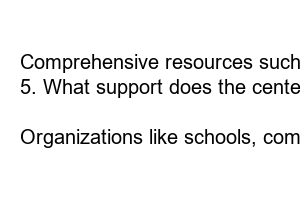아동복지통합서비스 사이버교육센터
Title: Child Welfare Integrated Service Cyber Education Center: Empowering Children with Digital Safety Knowledge
Introduction:
Child Welfare Integrated Service Cyber Education Center is a revolutionary initiative aimed at prioritizing the digital safety and well-being of children. In this modern age, where technology plays a significant role in their lives, it is crucial to equip children with the knowledge and skills necessary to navigate the digital world safely.
Subheading 1: The Importance of Cyber Education
As children increasingly engage in online activities, **cyber education** becomes essential to empower them to make responsible decisions. Equipping children with knowledge about online threats, privacy concerns, and responsible online behavior helps safeguard their well-being.
Subheading 2: The Mission and Objectives
The **Child Welfare Integrated Service Cyber Education Center** strives to create a safer digital environment for children. Through comprehensive cyber education programs, the center aims to develop children’s critical thinking skills, enhance their understanding of cyberbullying, and provide practical strategies to combat online risks.
Subheading 3: Interactive and Engaging Learning
The center’s **interactive learning modules** ensure that children are actively engaged in their cyber education. Through interactive videos, quizzes, and case studies, children learn how to recognize and respond to online threats effectively.
Subheading 4: Collaborative Approach for Parents and Educators
To foster a holistic learning environment, the center actively encourages parents and educators to participate in the cyber education process. Workshops and seminars equip parents and educators with the knowledge to guide children through potential online challenges, making it a collaborative effort to ensure children’s digital safety.
Subheading 5: Partnerships and Resources
The center collaborates with various stakeholders, including schools, community organizations, and law enforcement agencies, to support the digital safety of children. **Comprehensive resources** such as age-appropriate lesson plans, online safety guides, and tip sheets are available to support parents and educators in their efforts.
Subheading 6: Continuous Support and Helpline
The center recognizes that children may encounter online risks or require assistance. Hence, it provides a **dedicated helpline** where children can seek support or report concerning incidents. Trained professionals are available to address children’s concerns and help them navigate the challenges they may face in the digital sphere.
Summary:
Child Welfare Integrated Service Cyber Education Center is committed to empowering children with the knowledge and skills necessary to navigate the digital world safely. Through interactive learning modules, collaborative efforts with parents and educators, and continuous support, the center aims to create a safer digital environment for children. By prioritizing cyber education, we can equip children with the tools they need to make responsible choices and protect themselves from online threats.
FAQs:
1. Why is cyber education important for children?
Cyber education is crucial as it equips children with knowledge about online threats, privacy concerns, and responsible online behavior, ensuring their safety in the digital world.
2. How does the center engage children in cyber education?
The center uses interactive videos, quizzes, and case studies to engage children actively in their cyber education, making the learning experience enjoyable and effective.
3. Are parents and educators involved in the process?
Yes, the center actively encourages parents and educators to participate in the cyber education process through workshops and seminars, making it a collaborative effort to ensure children’s digital safety.
4. What resources are available for parents and educators?
Comprehensive resources such as age-appropriate lesson plans, online safety guides, and tip sheets are available to support parents and educators in guiding children through potential online challenges.
5. What support does the center offer to children facing online risks?
The center provides a dedicated helpline where trained professionals are available to address children’s concerns and help them navigate the challenges they may face in the digital sphere.
6. How can organizations collaborate with the center?
Organizations like schools, community organizations, and law enforcement agencies can partner with the center to support the digital safety of children and contribute to creating a safer online environment.

